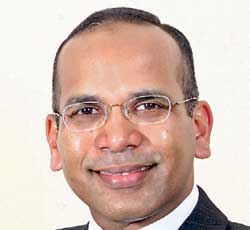Saturday Feb 21, 2026
Saturday Feb 21, 2026
Wednesday, 24 January 2018 00:08 - - {{hitsCtrl.values.hits}}
 The second law of CEO communication is for the leader to connect emotionally with their audience. This is generally done by telling stories or anecdotes.
The second law of CEO communication is for the leader to connect emotionally with their audience. This is generally done by telling stories or anecdotes.
The best recent example of this is Oprah’s acceptance speech at the Golden Globe Awards. In a speech of less than nine minutes, she used four stories and anecdotes to illustrate her points. The result? People start to view her as a possible contender for the US presidency in 2020! Such is the power of stories.
In 2004, a totally unknown provincial politician by the name of Barack Hussein Obama delivered a speech at that year’s Democratic National Convention (DNC) in Boston, Massachusetts. Four years later this very same “unknown” politician became the President of the United States, beating the much better known candidate Senator John McCain. What did the trick?
Obama’s defining speech at the 2004 DNC convention. The speech was a series of stories and anecdotes in which he adeptly weaved his own life story with that of the American Dream and the values that sustain it. The upshot? His ability to tell stories put Obama in the White House.
In fact, the common denominator of most great leaders has been their ability to tell stories and thereby connect emotionally with their followers. From the great religious leaders to Mahatma Gandhi, from Abraham Lincoln to Winston Churchill, from JFK to Reagan, from Henry Ford to Steve Jobs, from Richard Branson to Elon Musk – all have been able to connect with their audiences and achieve great things by telling stories. In other words, a hallmark of outstanding leaders is great storytelling.
Great companies are places where their culture and ethos are carried from generation to generation through stories and anecdotes of their own leaders. Leadership and Executive Coach, Mentor and Consultant Ronnie Peiris says such corporate storytelling is like Greek myths – they sustain corporate culture and values over the long haul.
Top CEO Communicator Giam Swiegers says, “If I can give leaders one bit of advice about improving communication skills: spend a bit of time understanding how you tell stories.”
Today, workplace employee engagement is at record lows worldwide, therefore leaders at every level need to use every single tool in the CEO communication tool box to engage employees to achieve outstanding results. The ability to connect with audiences emotionally by telling stories and anecdotes is one of the best tools CEOs have to inspire their people to achieve great things.
As the Native American proverb goes: “Tell me the facts and I’ll learn. Tell me the truth and I’ll believe. But tell me a story and it will live in my heart forever.” As a CEO on a quest to build a great company or team, you want your people to remember, hopefully forever, what you say.
Learn more about CEO Communication at YKG’s flagship training workshop, “Stair to CEO – For Senior Managers on their way to be CEO”, on Friday 16th February at the Cinnamon Grand, Colombo. Call or mail to register: 077-999-2442, [email protected].